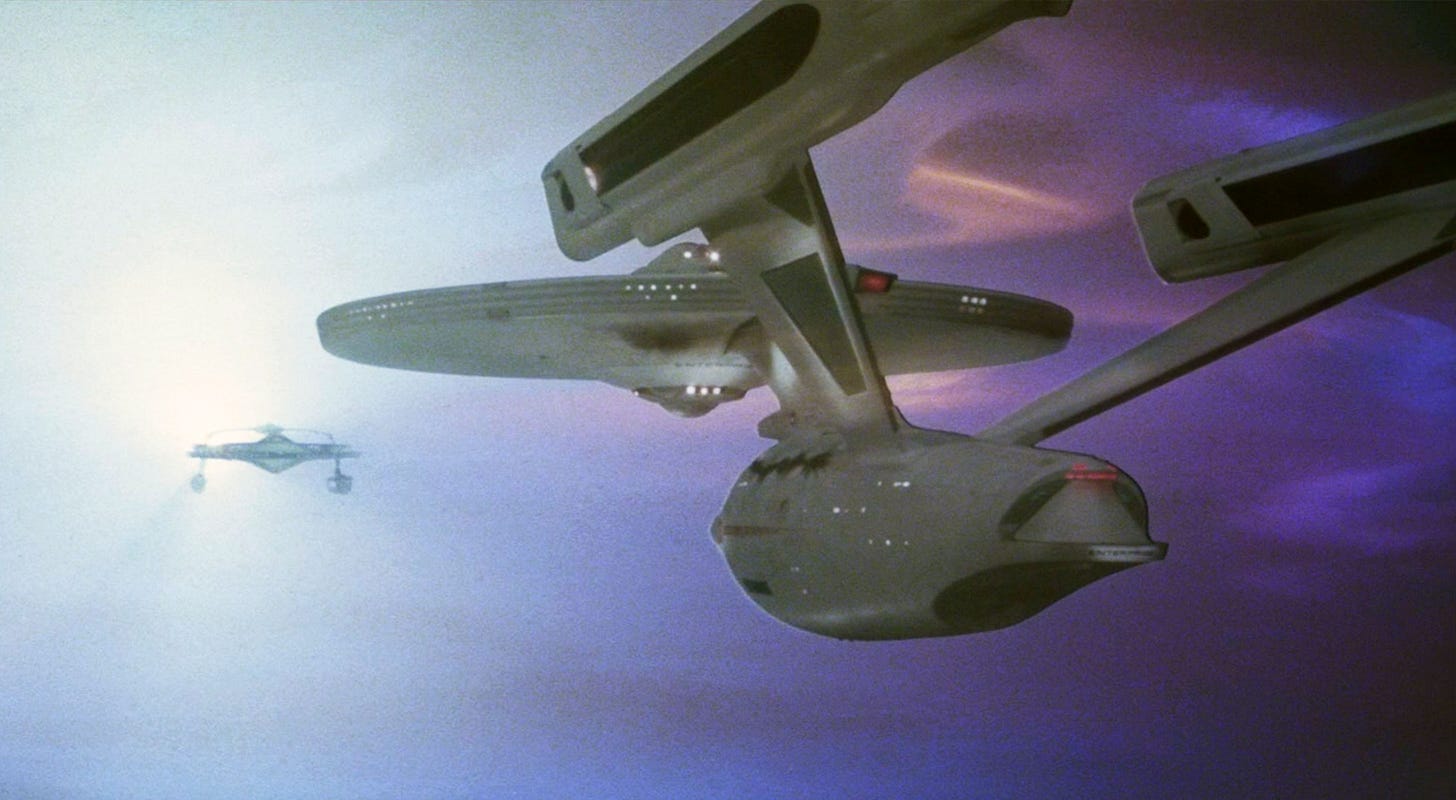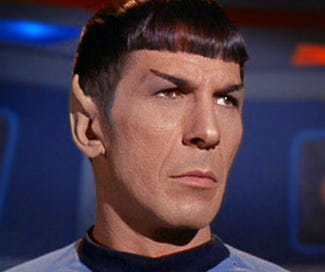Partisan Heroes: Spock
Scroll to the end for the best version of Amazing Grace you've never heard.
We need to talk about Spock.
Who’s that? Glad you asked. He’s got pointy ears, green blood, and nerdy haircut.
Got it? Good. Here’s the thing: the world is full of enormously stupid and emotional fools. Too many humans, in other words. We desperately need more folks who act like him: reasonable, logical, but with a deep understanding of what makes humans… well, us.
OK, sure, he’s a space alien in a silly science fiction show from the 1960s. That said, as long time fans will tell you, he is one of America’s biggest pop culture icons for a goddamn reason. Heck, one could even say he’s a full throated sex symbol (the actor who played Spock, Leonard Nimoy, was constantly surprised at the attention from women he received).
Why though?
He offered an alternative vision of masculinity that wasn’t big on pomp, circumstance, or puffing one’s chest out (sorry, Captain Kirk, but you gotta wait until the next essay). Spock focused on his crew, getting the job done, and doing it with a sense of principles that shame most of us. In this essay, I will offer up an example from Spock canon to illustrate the point and how this character can still teach us even today.
Quick note of business: the only Spock worth learning from is Nimoy’s. What do you take me for, some kind of heretic? Call me when those other two guys are names I can even remember. Also, spoiler warning cause I don’t give a fuck you should’ve done your homework by now see me after class.
The character’s finest moment was his sacrifice at the end of Star Trek II: The Wrath of Khan. Two core themes of the film are aging and death, especially within the context of no-win scenarios. You see, that nasty man Khan Noonien Singh had been hunting his Great White Whale (goddamn it Kirk, I already said you have to wait) and blew the bejesus out of the U.S.S. Enterprise in an ambush.

Enterprise gets her wily comeuppance forcing Khan to activate the Genesis device. “What’s that, nerd?” you ask? Don’t worry about it, basically everyone is going to die unless Scotty gets the warp drive back online. Don’t worry about what a warp drive is, either. In fact, go fuck yourself. I’m a nerd. Just kidding! Please keep reading.
OK! So everyone is about to die. There is an important idea hanging over the entire movie, discussed previously by Kirk and Spock.
The needs of the many outweigh the needs of the few.
Or the one.
There’s a lot going on in the world where folks are demanding you spend your time and energy for this thing or that. See the actions of the airman that burned himself to death for perhaps the most extreme example of what I’m talking about here. It also helps demonstrate the ultimate error in this kind of issue.
Sacrifice is one of the greatest ideals humans have. We sacrifice for our families, our children, and our homes. Sacrifice built all the great civilizations, religions, and accomplishments of our short lived, ambitious species. Spock’s own death in the movie stands above as a prime example for two reasons. Can you spot them?
First, the threat is real and imminent. Spock, his friends, his family, are dead in three minutes. His actions save the ship. They get away from Khan’s suicide bomb because of what Spock does. Because of his sacrifice, something changes in his life. Not some faraway cause, future, or ideology. The life he has happening right now. The second one is harder to see, and I’ve yet to find anyone that notices it. It happens in the first few moments of the clip linked above, where Spock turns from his console, looks down, then to the side, and stands up.
The needs of the many outweigh the needs of the few.
Or the one.
But the one must choose it.
The supremacy of the individual must remain paramount. Should sacrifice be required, we must choose it. You must choose it. I must choose it. It’s like how Dietrich Bonhoeffer, famous anti-Nazi German pastor, put it when considering the fate of his own nation.
When a man takes guilt upon himself in responsibility, he imputes his guilt to himself and no one else. He answers for it. Before other men he is justified by dire necessity; before himself he is acquitted by his conscience, but before God he hopes only for grace.
Consider this first and foremost as you go about your life. Focus on your family, your friends, and your home. Focus on what you can change. And should your sacrifice be required, go with the certainty it will work because you chose it for the only reasons that have ever mattered.
Perhaps they’ll hear Amazing Grace at your funeral, too.
Thanks for reading!
Let me know your thoughts in the comments. I love engaging with readers, and these pieces are a means to that end. If you think this was worth your time, please share via Restack or personal recommendation. That means a lot to me.
If you want to support my writing, kindly consider a paid subscription. I work cheap!





Well done. WoK is my favorite Trek movie. I remember watching this scene, when Spock was listening with what looked like disinterest, knowing that as soon as he turned his head, he was going to do something. No questions asked, no words spoken, no reservations about what needed to be done. He just slipped out like an Irish goodbye, and took action. And after the dust settled, his only concern was that of the many.
Of course, the funeral scene was epic as well. Oh, the pipes are playing...
It’s ok, he comes back in the next movie. So why am I crying?
Haven’t rewatched that movie since I saw it in the theater, but the two lines I remember are the one about two-dimensional thinking and the one about the needs of the many.
Yes, of course Spock chose the course of self sacrifice, and it would have to be Spock. He realizes the dilemma, ponders it for a few seconds, reaches the only logical conclusion, and quickly gets to work implementing his solution. No time for emotion or goodbye. Or asking for permission.